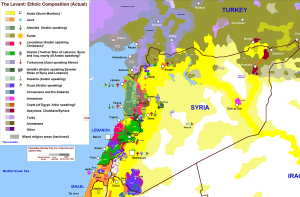We have been hearing about the Syrian Civil War for nearly one year now. The death toll is in the hundred thousands, innocent civilians being victimized, and the rebel groups are getting angrier and more violent. Meanwhile, the Syrian state led by President Assad is now confirmed to be using chemical weapons against its people.
 The Obama administration has spoken critically of Syria’s international law violation prohibiting the country’s use of chemical weapons. At least one hundred people died as a result of the use of chemical weapons and more are expected to die if “nothing is done.” There is, no doubt, an excellent case to be made for getting involved and preventing more deaths.
The Obama administration has spoken critically of Syria’s international law violation prohibiting the country’s use of chemical weapons. At least one hundred people died as a result of the use of chemical weapons and more are expected to die if “nothing is done.” There is, no doubt, an excellent case to be made for getting involved and preventing more deaths.
The question, however, that has been frequently asked is “Should the U.S. get involved in Syria?” We’re hearing various answers from foreign policy experts and politicians citing various reasons as to why they believe what they believe. From John McCain’s pleads for U.S. leadership, to Obama’s wishy-washy “diplomacy as an option but not really”, to Rand Paul’s fiscally conservative reminders that a war would cost much more than the country could afford, and there is plenty of disagreement as usual.
Instead of asking “Syria: Go or No?” perhaps we should be asking: What exactly are we going to do if we intervene?
I have been digging around looking for more direct answers to the “We’re here, now what?” question, but I can’t seem to find nearly as much information. So far, it seems that we are just going to send a missile towards Assad’s base to teach them a lesson for violating international law. “No American boots would set foot in Syira,” Obama assures the public last Tuesday in his address on the possible strike. For now, at least.
In Iraq the U.S. got involved for a similar reason. The country was in chaos, people were killing each other, and the threat of the state acquiring weapons of mass destruction put people in panic. Might I add that chemical weapons are also classified as a weapon of mass destruction, the only difference is that we know for sure that Syria has them, instead of guess-work that got Americans involved in Iraq. Setting that aside though, how did the U.S. actually help the Iraqi people when they got involved? Testimonies and leaked documents from military and Iraqi officials say that American involvement did benefit the Iraqi people in comparison to the cost burden. Regime change, it seems, is not what the Americans are financially and logistically able to do at the moment. It failed in Iraq and it will likely fail in Syria if similar measures are taken.
There is the problem, of course, of the violation of international law; the use of chemical weapons.
 In order to keep the world in line and under control when it comes to new weapons technology and territorial disputes, consequences and punishment need to happen to countries that clearly violate the rules. One could argue that World War II was partially caused by the lack of action in part of the U.K. and the U.S. when they did nothing to stop Italy from invading Somalia, or Germany and the rest. Rules are meaningless if there is no punishment, this is a slippery slope argument applicable to preventing Iran from acquiring nuclear weapons. In other words, if Iran sees the consequences Syria faces, then they may re-think their so-called nuclear program.
In order to keep the world in line and under control when it comes to new weapons technology and territorial disputes, consequences and punishment need to happen to countries that clearly violate the rules. One could argue that World War II was partially caused by the lack of action in part of the U.K. and the U.S. when they did nothing to stop Italy from invading Somalia, or Germany and the rest. Rules are meaningless if there is no punishment, this is a slippery slope argument applicable to preventing Iran from acquiring nuclear weapons. In other words, if Iran sees the consequences Syria faces, then they may re-think their so-called nuclear program.
If rules are not followed, the international world will go into chaos. Is Syrian situation the same? If the conflict is ignored, would that mean that the problem would continue to expand to a point where, by the time intervention is necessary due to a national security threat, the problem would be too big to avoid a full scale war?
If we are being honest, let us just think about how doomed Syria will be if the U.S. decided to fledge a full war on them. We have the U.S., quite possibly all of their allies which include most of Europe, Canada, China (perhaps) and Australia, etc., and then Syria which might have Russia and Iran. Not including weapons, numbers, artillery, and military capability of either party and its allies, this does not even begin to constitute a threat.
In short, there is really no point in bombing them to “teach them a lesson” or to look intimidating. If national security is truly in question, there is no doubt the U.S. has the means to defend itself without sustaining heavy casualties. World War I and II were a different story, but if it happened again, there is no question the U.S. could obliterate any country that is foolish enough to threaten them. War is not in the best interest of any party.
What about the innocent victims that died from al-Assad’s use of chemical weapons?
What strikes me as ironic is that Obama, in his address, talked about the dangers and horrors of chemical weapons and gases without mentioning that striking Syria could also result in even more horrors of people burning to death. What do you think a missile strike would entail? A magic weapon used to make people change their minds? In other words, this is basically causing more horror to show the rest of the world not to start horror in the first place. Fighting fire with fire.
All of this is not even mentioning that the U.S. is now funding the Syrian rebels and giving them arms to fight the Assad regime. This is turning into the same regime change that the U.S. said they would succeed when they set out in the Iraq war. They may not press for regime change now, but what’s to stop them from doing so when “we’re already here, we might as well.”
I don’t know the answers, but let’s not forget that the Syrian conflict is not the good guys vs. the bad guys. The rebels have behaved almost as viciously as the government, their goals are perhaps not that different to Americans when a different strand of Islam is the purpose. The situation needs to be sorted out to the people who want peace and know their country best. There are various parties involved in the civil war and the conflict should not be sorted out by people who want to establish one kind of government to a culture where secular liberal democracy cannot coincide.
I would encourage American, UK, and UN officials to take part in helping the Syrian government achieve peace through talk and diplomacy. Send any aid possible for assisting the affected parties to come to terms and agree on a solution that causes the least amount of further harm to civilians who are the true victims of this war. We can help, we should help, but not with guns. It is not naive or ignorant to push for peaceful measures of action.
On that note, I would respectfully like to ask that Congress re-think the consequences of what a military strike on Syria would entail. If the U.S. is so strongly for peace, they should follow this example of listening to the public because they have it right for once, no war with Syria.
Nazzy S. is the author for The Midnight Zone. Twitter @NazzyTheGreat
This article was originally published in The Midnight Zone.